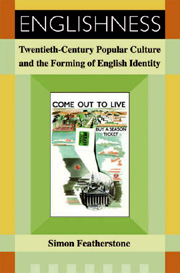5 - The North
Published online by Cambridge University Press: 12 September 2012
Summary
The journeys in search of England described in the previous chapter were performances of both national identification and national exclusion. Travelling provided a means of establishing a cultural and political sense of the territory of Englishness but this was achieved through the consolidation of only a particular part of that territory as possessing essential national values. The consensus that real England lay somewhere on the Downs near Plumpton or in any number of other such places on the southern and westward trajectory from London merely reinforced the power of an already-existing economic and cultural hegemony. In this sense the often-repeated opposition of London and real England was a false one, for these journeys proved the reciprocity of the capital and its surrounding countryside. One of S. P. B. Mais's travel books is called It Isn't Far from London (1930) and the title tells a cultural as well as a geographical truth. The interrelation of the cultural industries of the metropolis and the southern rural signifiers of Englishness is confirmed in the discourse of many of the writers discussed in the previous chapter, who moved easily between the oppositions of metropolis and pastoral sanctuaries of nationhood. It is a dynamic that might go some way to explaining why H. J. Massingham and Roger Scruton made their covenants with the land in Oxfordshire and Wiltshire rather than, say, on a hill-farm in north Derbyshire.
- Type
- Chapter
- Information
- EnglishnessTwentieth-Century Popular Culture and the Forming of English Identity, pp. 84 - 102Publisher: Edinburgh University PressPrint publication year: 2008



